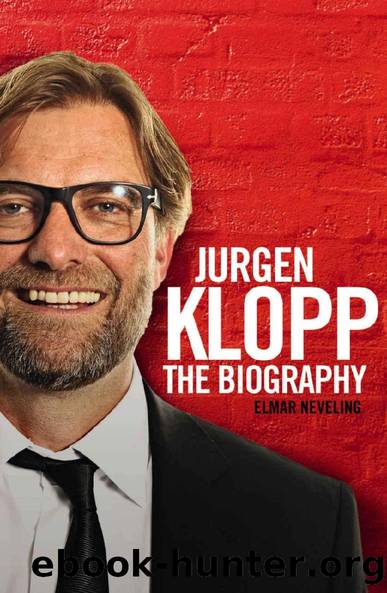Jurgen Klopp: The Biography by Elmar Neveling

Author:Elmar Neveling
Language: eng
Format: epub
ISBN: 9781473529519
Publisher: Ebury Publishing
Published: 2016-02-10T18:30:00+00:00
10
THE BUSINESS OF FOOTBALL
At the very start of his time at Dortmund, Jürgen Klopp announced that his target was to help the club get back on the right track. By 2012, there was no doubt: his mission was accomplished â both on the pitch and off it. Klopp had proved himself the perfect man for the job not just in footballing matters, but also on the business side as well. It was Klopp who would phone wavering BVB sponsors personally and persuade them to continue their relationship with the club. He was every bit as capable of charming the suits as he had been the players and fans. For chairman Hans-Joachim âAkiâ Watzke, Klopp was worth his weight in gold with his support for the clubâs financial consolidation, which for all the success on the pitch remained the focus of the entire club hierarchy.
The hard work that went in to balancing the books was bearing fruit. In August 2012 the club announced that revenue had increased to â¬215.2 million for the past financial year and they had generated â¬34.3 million in pre-tax profits. This was not just a huge step forward on the 2010â11 financial year, when they had raised â¬151.5 million in revenue and made â¬9.5 million in pre-tax profits, but was also the best financial return in the clubâs history. It wasnât just prize money being added to the balance sheet: the transfer fees received for Shinji Kagawa (â¬16 million) and Lucas Barrios (an estimated â¬8.5 million) also made a healthy contribution. It meant the club was also able to take an impressive chunk out of its debt burden. In 2005, this had stood at around â¬180 million, with BVB buying back their stadium bit by bit. The new managementâs debt restructuring programme and tightening of the purse strings meant that by 2012 they could reduce their liabilities to â¬40.6 million.
The new financial strength made possible the purchase of native Dortmunder Marco Reus for a reported â¬17.5 million from Borussia Mönchengladbach in January 2012. While the club had made a tidy sum from the sales of Kagawa and Barrios, the capture of the German international was an indication that they were now in a position to spend money as well. With their debt under control, money could now flow back into the team. For the 2011â12 financial year, they were able to afford a wage bill of â¬74.5 million, with just short of â¬60 million of that going on player wages. At 35 per cent of revenue, this was still a âvery healthy ratioâ, in Watzkeâs estimation: in top-level football, wage bills of 50 per cent of turnover or more are common (Arsenalâs wages, by comparison, were 55 per cent of turnover for the 2013â14 financial year).
âWe arenât running a savings account,â Watzke said. âNevertheless, we will continue to follow our ultra-conservative, old-fashioned policy of not spending more than we earn.â Watzkeâs policy was also designed to prevent Dortmund getting soft in their hunt for young, hungry players.
Download
This site does not store any files on its server. We only index and link to content provided by other sites. Please contact the content providers to delete copyright contents if any and email us, we'll remove relevant links or contents immediately.
Machine Learning at Scale with H2O by Gregory Keys | David Whiting(4312)
Never by Ken Follett(3954)
Harry Potter and the Goblet Of Fire by J.K. Rowling(3856)
Fairy Tale by Stephen King(3394)
Unfinished: A Memoir by Priyanka Chopra Jonas(3388)
The Man Who Died Twice by Richard Osman(3077)
Will by Will Smith(2919)
It Starts With Us (It Ends with Us #2) by Colleen Hoover(2367)
Rationality by Steven Pinker(2363)
Can't Hurt Me: Master Your Mind and Defy the Odds - Clean Edition by David Goggins(2339)
The Dark Hours by Michael Connelly(2307)
The Storyteller by Dave Grohl(2234)
Friends, Lovers, and the Big Terrible Thing by Matthew Perry(2230)
The Dawn of Everything: A New History of Humanity by David Graeber & David Wengrow(2208)
The Becoming by Nora Roberts(2201)
The Stranger in the Lifeboat by Mitch Albom(2120)
Cloud Cuckoo Land by Anthony Doerr(2110)
Love on the Brain by Ali Hazelwood(2074)
Einstein: His Life and Universe by Walter Isaacson(2021)
